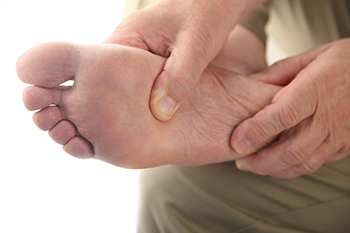
Diabetic neuropathy is a condition common to many people with diabetes. It is a numbness caused by high levels of blood sugar that damage the peripheral nerves, including those to the lower legs and feet. Symptoms of diabetic neuropathy include a loss of feeling in the feet, along with a burning and tingling sensation, muscle weakness, and in some cases difficulty walking. Men are more likely than women to develop diabetic neuropathy, and high levels of cholesterol and smoking increase the risk. There are a number of suggestions to help prevent diabetic neuropathy from becoming worse. The first is controlling blood sugar levels. In addition, following a regime of daily foot care is a good idea. Keep the feet washed, dried, and moisturized. Also, check the feet, toes, and ankles each day for cuts or sores that may become infected if left unattended. Keep toenails cut straight across to avoid ingrown toenails. It is also suggested that you make an appointment with a chiropodist for the removal of problem corns, and calluses, and help with wounds that won’t heal properly. This foot specialist also can monitor your foot health through regular visits.
Diabetes can cause serious problems in the lower limbs if proper preventive measures are not taken and diabetic wound care is not performed. If you would like to learn more about caring for diabetic feet, please consult with one of the chiropodists from Complete Family Footcare & Therapy. Our clinicians can help you maintain the health of your lower limbs and your mobility.
Diabetes can lead to a host of foot and ankle complications, including:
Poor circulation
Peripheral neuropathy
Diabetic foot wounds and ulcers
Infection
Corns and calluses
Dry, cracked skin
Nail disorders
Hammertoes
Bunions
Charcot foot
If you have diabetes, you must be vigilant of any changes in your foot health. This is best done through daily foot inspections. Using a mirror to help you if necessary, look for any:
Cuts, scrapes, sores, or wounds
Bruising or discoloration
Swelling
Rash
Foul odor
Nail changes
Hair loss
Warmth and inflammation
Deformities
Lower limb pain
Strange sensations (numbness, tingling, burning, pins, and needles)
If you detect anything unusual, seek the care of a chiropodist as soon as possible. If you have any questions, please feel free to contact our offices located in . We offer the newest diagnostic and treatment technologies for all your foot care needs.
